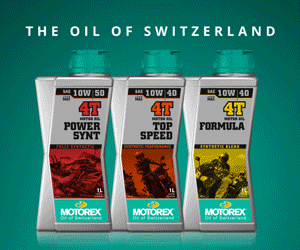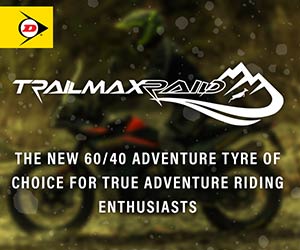Around the world with The Bear – Part Four
The King of Every Kingdom – Around the world on a very small motorcycle
With J. Peter “The Bear” Thoeming
In Part 3 we completed our Nullabor journey and sailed over to Singapore. Now it’s time for more fun with Annie, and then a parting of the ways. But we know it turned out well, don’t we? You can find Part 1 and Part 2 here.
Singapore
Most of our fellow passengers were on a Sea-Jet tour to Britain, which included a hotel stopover in Singapore and then a cattle jet to London. The driver of the bus taking them – and us – to their hotel was an optimist and pulled the old, ‘Whoops, we just happen to have stopped outside the shop of my brother, why don’t you just look in,’ routine.
I spotted a little Chinese hotel across the road and we ducked off the bus, leaving my camera case behind. After checking in at the Tong Ah, I discovered my loss quickly enough – and nearly had a heart attack – but the case had been offloaded at the tour hotel and I had no trouble getting it back.
Before Annie flew out to London, we had a couple of marvelous days together. We shopped, sightsaw and, of course, dined. Down by the harbour we discovered the statue of the ‘Merlion’, Singapore’s heraldic beast. It bears a plaque reading ‘The Merlion is a mythological beast created by the Singapore Tourist Board in 1971.’ Don’t laugh; at least they know the difference between mythological and mythical (and mystical), which is more than most people seem to.
With Annie gone, it was time to tame the Paper Tiger, so we went down to the insurance office for Third Party insurance, valid in Singapore and Malaysia; to the Singapore AA for an import licence and a circulation permit; to the shipping office for a delivery order, and to the wharf for… the bikes?
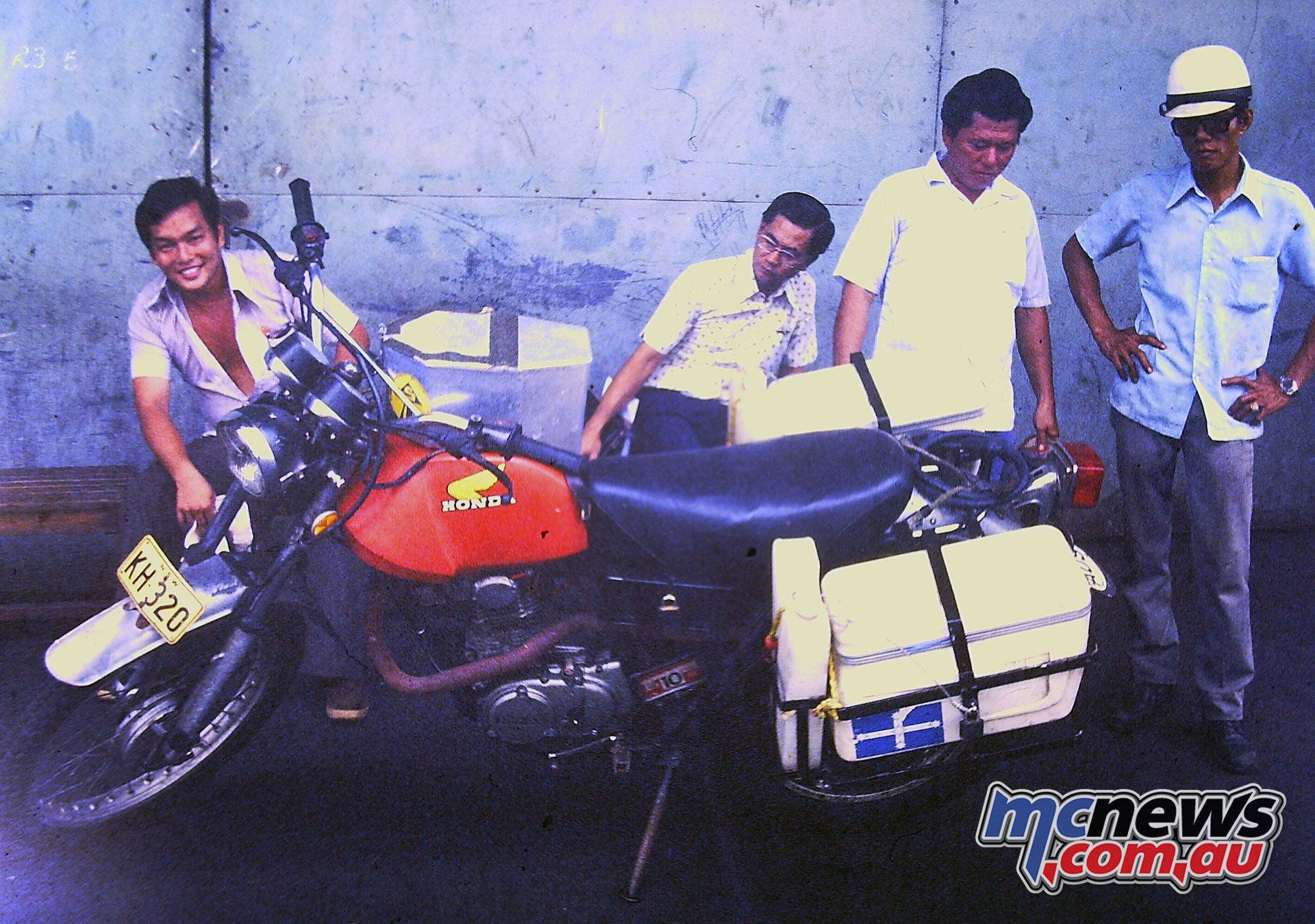
Oh, no! First the bikes had to be lifted out of the hold. They were covered in a stinking film of lanolin from the sheep with which they’d shared their home. Then the wharfage had to be calculated. A clerk measured the bikes over the extremities, and arrived at a figure of two cubic metres each. This was transmuted, by the magic of Singaporean arithmetic, into a weight of two tonnes each. Just wait, I thought, until Soichiro Honda hears about his new two-tonne 250cc trail bikes.
Clutching a form given to us by the measurer, we then had to queue for a delivery list. A very thorough questionnaire with three copies, this form actually demands the time of day- in two places. Is this some way of measuring how fast you fill out forms? Is there, perhaps, a prize? ‘Most Improved this month goes to Charlie and The Bear, who have come up…’ A very kind Indian fellow-sufferer helped us wade through this.
We paid the wharfage and got the bikes, which refused to start. After a lot of pushing, swearing and checking of spark, we located the trouble. The carburetors were blocked by muck no doubt settled out of the petrol by the vibration on board. Red faced and still puffing, we ran the gauntlet of Customs and police, who checked all the papers.
The sergeant in charge, a large Sikh, had a brother in Sydney who was stationmaster at Coogee. There’s no railway station at Coogee, but I was not about to tell the sarge that. Singapore traffic, here we come.
We took full advantage of the city’s attractions over the next few days: eating in Coleman Street; watching Chinese opera in Sungei Road; eating in Arab Street; delicious roti pratha across the road from the Tong Ah for breakfast; drinking the superb fruit juices made from real fruit in front of your eyes.
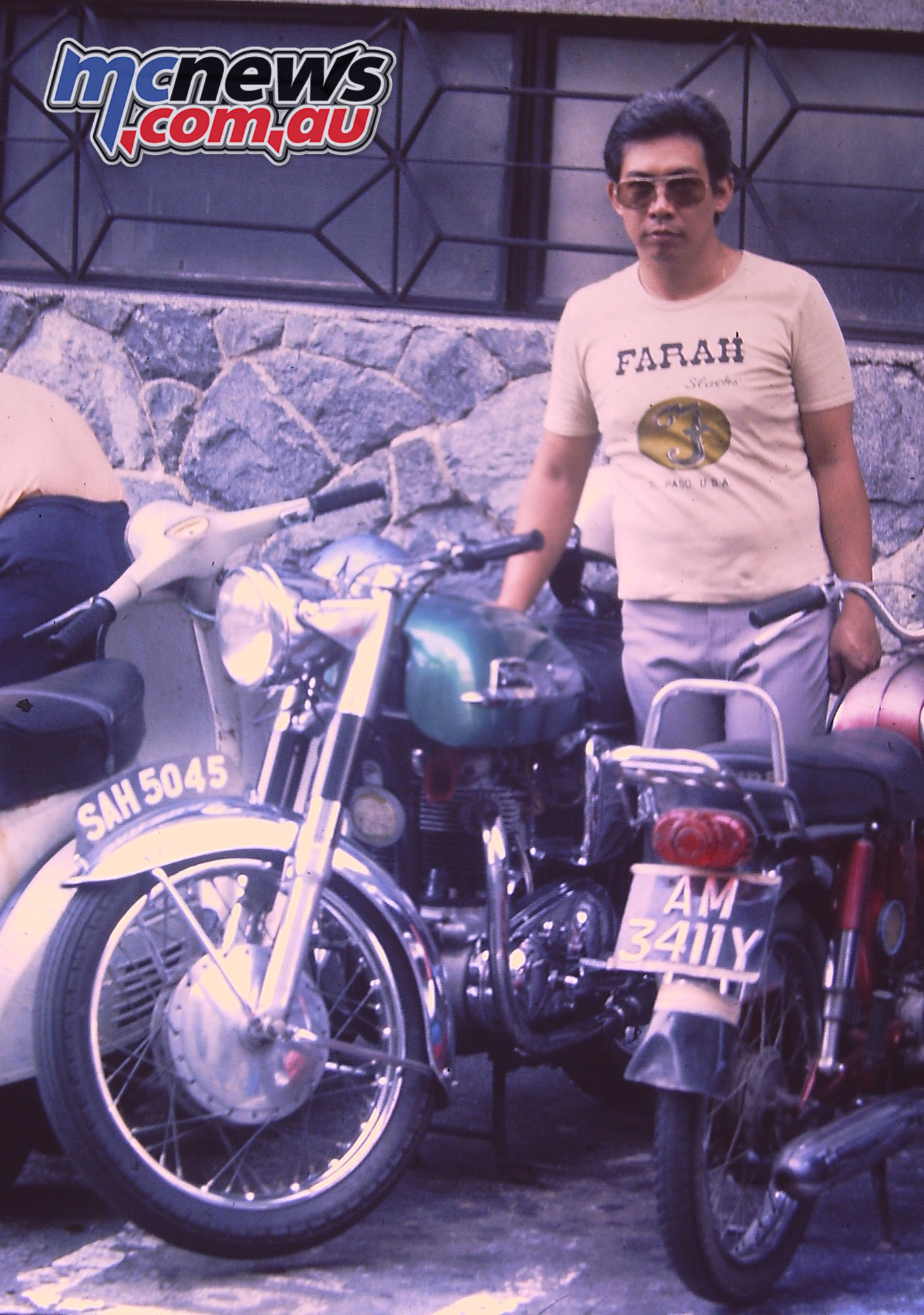
It’s a bike city, but most of them are 50 and 70cc tiddlers. Suzuki was advertising the ‘power alternative’, an 80cc step-through. We saw a well-preserved Norton and two Gold Wings as well as a number of ex-War Department BSAs with girder forks, and large sidecar boxes, which the Japanese had obviously disdained to take home after WW2. Even some of the 50s had boxes on the side and delivered everything up to lengths of angle iron.
Singapore is a clean city. It might be more accurate to say that it’s quite compulsively spotless, except for the waterways. Fines for littering are astronomical. I could well imagine living there for a while, but only for a while. It’s all a bit too heavily regimented and conformist for comfort. When the time came for us to leave, we rode out on Changi Road and back around the reservoir to the border post at Woodlands.

Malaysia
Dr Mahathir also said that Malays are lazy. Perhaps, perhaps. I think that Malays just like to choose their own methods and priorities. Leaving Singapore, out on the Causeway, was much easier than coming in. The gentleman processing us at the Malaysian border was in civvies, and we had a little argument.
 I maintained that a Carnet de Passage was necessary for Malaysia and he disagreed. ‘Perhaps I’d better see a Customs officer,’ said I. He drew himself up to his full four feet ten inches, threw me a withering glare and replied, ‘I am a Customs officer!’ What else could I do but accept his ruling? I was to regret that later.
I maintained that a Carnet de Passage was necessary for Malaysia and he disagreed. ‘Perhaps I’d better see a Customs officer,’ said I. He drew himself up to his full four feet ten inches, threw me a withering glare and replied, ‘I am a Customs officer!’ What else could I do but accept his ruling? I was to regret that later.
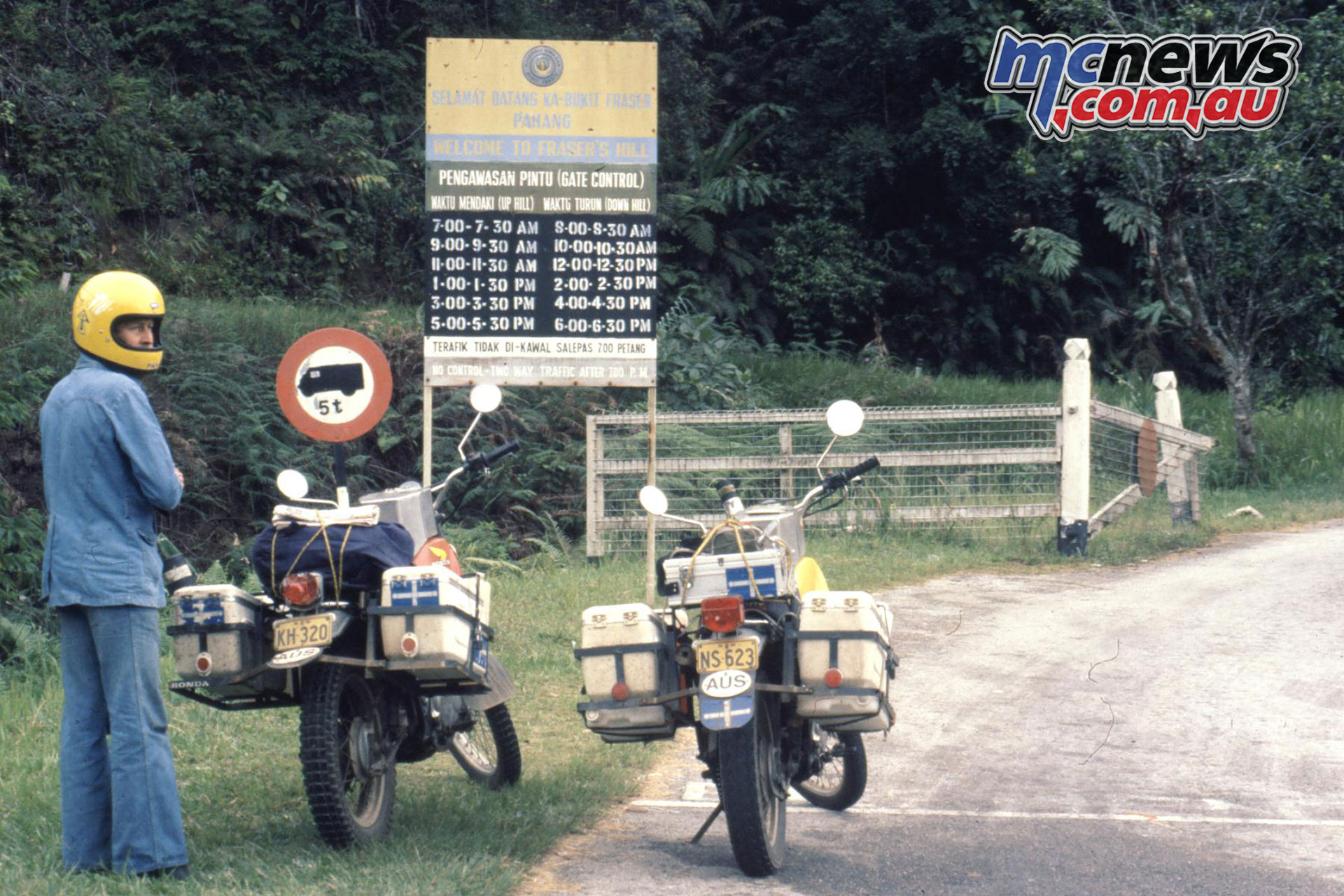
We rolled out into Johore Baharu and soon found the way to Tinggi. A good if slightly bumpy road took us up into the hills and the rubber and palm oil plantations. With rain threatening, we stopped for a moment to don wet-weather gear and saw a chilling tableau. Up the hill towards us, into a blind corner, came two trucks side by side having a drag on the narrow tar. I was very glad we weren’t out on the road…
In the little hotel in Tinggi I renewed my acquaintance with the dipper that takes the place of the shower in most South-East Asian countries. You just ladle water over yourself out of a large cement trough. It’s marvelously refreshing after a hot, sweaty day. A little farther up the coast we filled our tanks for the first time in Malaysia and discovered that a full tank cost about as much as a hotel room and three meals put together, which is to say bugger all. This proportion was to hold true in most places; half your daily expenses go for petrol, leaving half for you.
We rode on up the east coast, jungle swamps alternating with hill plantations. I cashed a traveler’s cheque at Mersing in a bank guarded by a little bloke armed with an enormous shotgun. Bit dangerous being a bank robber here, you could get hurt.
Lunch was consumed at the harbour, overlooking the colourful fishing fleet. All the boats had eyes painted on their bows to enable them to find their way through the shallows. People were only too happy to be photographed and I snapped some enormous grins.
The little village of Nenasi, where we had intended to stop for the night, didn’t have a hotel, so we went on to the regional capital, Pekan. Dinner of excellent kway teow, boiled and fried noodles, rounded off the day and we retired under the gently rotating ceiling fan. We left the luggage in the room next morning and rode the unburdened bikes up the beach. It was great fun and pleasant to be out of the traffic.
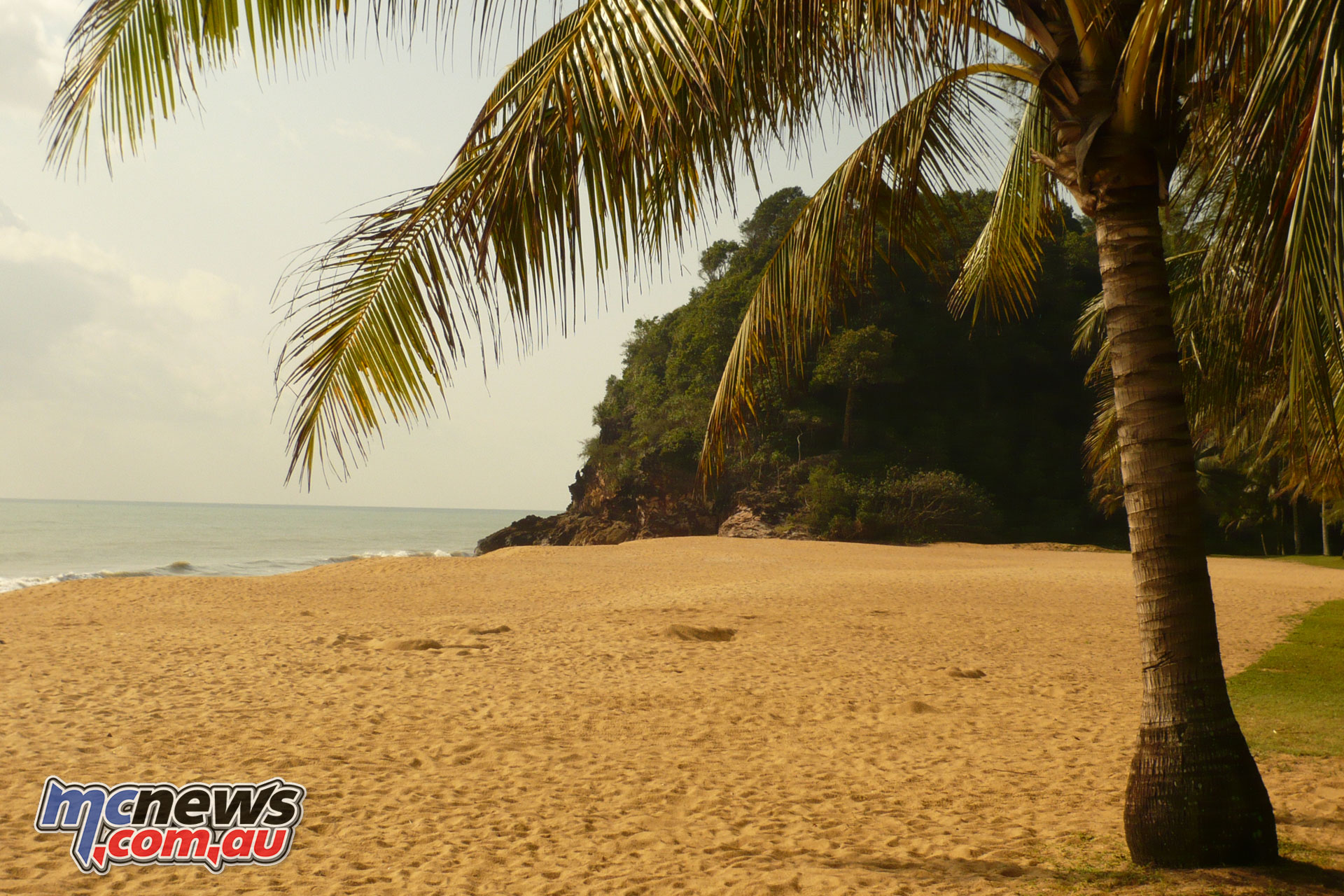
The South China Sea looked so inviting in the heat that we stopped for a dip, but the tepid water made it less refreshing than it might have been. When we came out, our feet had suffered a sea change—not into something rich and fine, as Bill Shakespeare has it, but into something black and sticky. The beach was full of blobs of half-solidified oil, no doubt washed from the bilges of passing giant tankers.
There was a fresh coconut lying on the ground near the bikes, and after a struggle I managed to get it open with my clasp knife. We found the milk refreshing and the meat delicious. By the time we rode back to town, the sun was high and very sharp. Fortunately we still had our shipboard tans and didn’t burn. Despite my tan, I was feeling pale and fat alongside the slim, beautiful Malays.
The Sultan’s museum provided quite a bit of amusement. All his possessions seemed to be kept there, from the stunning collection of Kris knives to his old toothbrushes. You could even admire his used underwear, lovingly labelled.
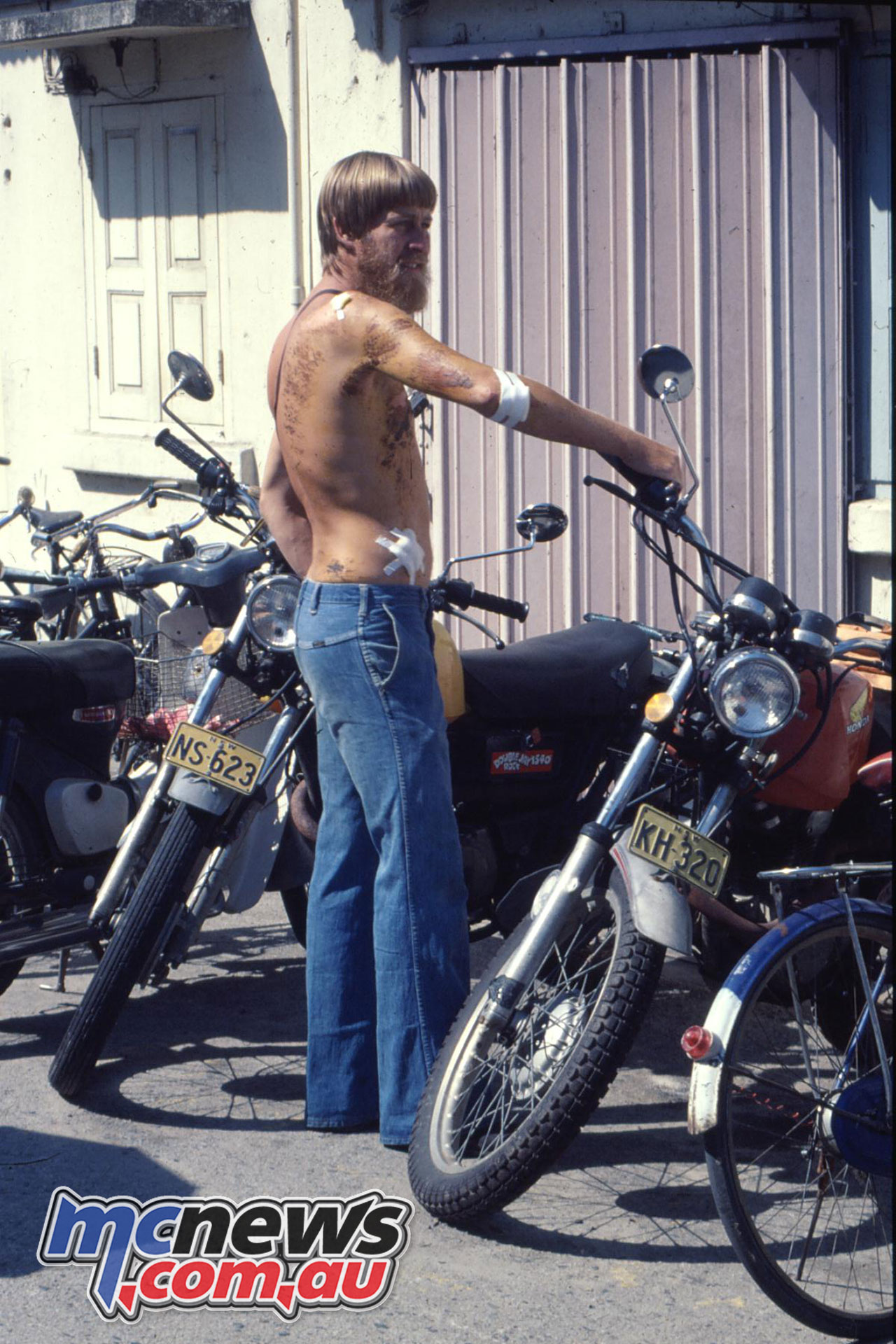
We also found that Malaysian TV wasn’t very Malaysian. After the news, they showed The Osmonds, and that was followed by Combat—dubbed. It was fascinating to see Vic Morrow opening his mouth and fluent—if badly synchronised—Malay coming out.
That all sounds good, doesn’t it? Tune in again next time when there are tears before and after bedtime!











